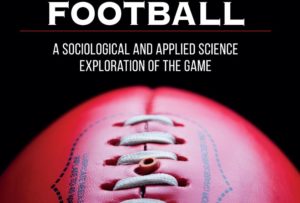 The latest theories on coaching, fitness and nutrition, elite and Indigenous footballers, women in the AFL, junior and community football development are covered in a new book from sport and health experts at Flinders University.
The latest theories on coaching, fitness and nutrition, elite and Indigenous footballers, women in the AFL, junior and community football development are covered in a new book from sport and health experts at Flinders University.
Advances in Australian Football – A Sociological and Applied Science Exploration of the Game (published by ACHPER) includes chapters by researchers from several Flinders schools, led by Sport, Health and Physical Activity lecturers at the School of Education.
Coaching techniques are tackled in a chapter by Associate Professor Shane Pill, who advises AFL and other leagues around the country.
He says that developing ‘thinking’ players will create better team performances and ultimately make Australian Rules football a much safer and enjoyable game for juniors.
Game-based coaching and game-play practice sessions give junior and senior players the chance to be more tactical, to play with purpose and respond more adeptly to the dynamics – and hazards – of the game.
“Compared to traditional training, which focuses on repetitive drill-based practice, the game sense approach gives players the skills to make better moment-to-moment decisions in a complex and dynamic sport,” says Associate Professor Pill, co-editor of Advances in Australian Football, a new in-depth look at the ‘Great Australian Game’.
“Drill based ‘off the line’ training can develop inattention ‘blindness’ that limits players’ perception decision-making and ability to play according to the realities of the game,” says Associate Professor Pill from the Sport, Health and Physical Education (SHAPE) Research Centre at Flinders University.
Now acknowledged as the preferred approach of the AFL coach development department, he says Hawthorn’s award-winning senior coach Alastair Clarkson is a great supporter of the game-sense approach.
“The view of the three-time premiership coach is that young footballers right down to under-10s are being subjected to far too many training drills and not enough football. As a result, young footballers being drafted into AFL clubs not having adequate decision-making skills.
“But the game at the elite level is not the only concern.
“Teenagers should be learning how to play the game by playing it – and learning to enjoy it,” Associate Professor Pill says.
These tactics, along with advances in player selection, player movement, sport medicine and nutrition, are adding to the evolution of the great Australian game, says SHAPE Research Centre director Professor Murray Drummond, co-editor of Advances in Australian Football.
“Over time, the game of elite Australian football evolved from a community-based sport to what is now – entirely professional amidst a billion-dollar industry that has enormous social and cultural influence,” Professor Drummond says.
“This book is unique in that it delves into the social, scientific and coaching aspects of Australian football, from elite player level to community ‘grassroots’ engagement and junior player, Indigenous and women player development.
“It explores, challenges and highlights the significance of Australian football in Australian society, as well as the enormous changes that have occurred within the sport since the early 1900s when clubs were starting to emerge.”
The role of elite football in defining masculinity and football club culture is examined in another chapter by fellow Flinders University Sport, Health and Physical Activity lecturer Dr Deb Agnew.
“My chapter, ‘Becoming a star: life as an elite Australian footballer, identity construction and withdrawal from the spotlight,’ is based on research with 20 retired footballers,” Dr Agnew says.
“There is strong evidence to support the influence of Australian football in the development of masculine identity.
“Young men are impressionable and when first drafted to an AFL club their self-image can be significantly influenced by the images projected by the media and society.
“In the same way, retirement from elite Australian football – whether voluntary or forced – can be a significant adjustment while they redefine their lives away from football.”
Similarly, parental involvement in junior football plays a large role in determining the club’s culture and attitudes towards winning and competition, says Flinders lecturer Dr Sam Elliott.
“Problematic sport-parenting in junior football can extend beyond unruly behaviour such as swearing and abuse,” Dr Elliott says.
“Negative consequences for youth sport can manifest from a range of parenting behaviours – and not just those ‘ugly’ forms of involvement that we commonly hear about in popular culture and mass media.”
Advances in Australian Football (A Sociological and Applied Science Exploration of the Game) is available online from the Australian Council for Health, Physical Education and Recreation (ACHPER).

